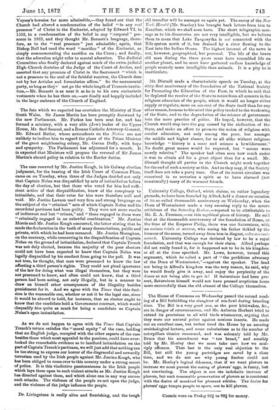The case reserved by Mr. Justice Keogh, in his Galway
election judgment, for the hearing of the Irish Court of Common Pleas, -came on on Tuesday, when three of the Judges decided not only that Captain Nolan was disqualified by acts of intimidation before the day of election, but that those who voted for him had suffi- -dent notice of that disqualification, knew of the conspiracy to intimidate, and that their votes for him were therefore null and -void. Mr. Justice Lawson used very firm and strong language on the subject of the " criminal " acts of which Captain Nolan and his -sacerdotal partisans had been guilty. They were not mere results of indiscreet zeal but "crimes," and "those engaged in them were " criminally engaged in an unlawful combination." Mr. Justice Morris and Mr. Justice Keogh concurred, the latter stating that he made the declaration in the teeth of many denunciations, public and private, with which he had been menaced. Mr. Justice Monaghan, -on the contrary, while concurring in the disqualification of Captain Nolan on the ground of intimidation, declared that Captain Trench was not duly elected, because the majority of the poor electors -could not have been expected to know that Captain Nolan was legally disqualified by his conduct from going to the poll. It was not tame, he thought, that men were presumed to know the law affecting a third person's rights. They could not plead ignorance -of the law for doing what was illegal themselves, but they were not presumed to know, and often could not know, that a third person had been acting, not only illegally, but in a manner to draw on himself other consequences of the illegality besides punishment for it. And we agree with the Times that this deci- sion is the reasonable one, whether or not it be the legal one, since it would be absurd to hold, for instance, that an elector ought to know that the candidate held a Government contract, which would disqualify him quite as much for being a candidate as Captain Nolan's open intimidation.


































 Previous page
Previous page